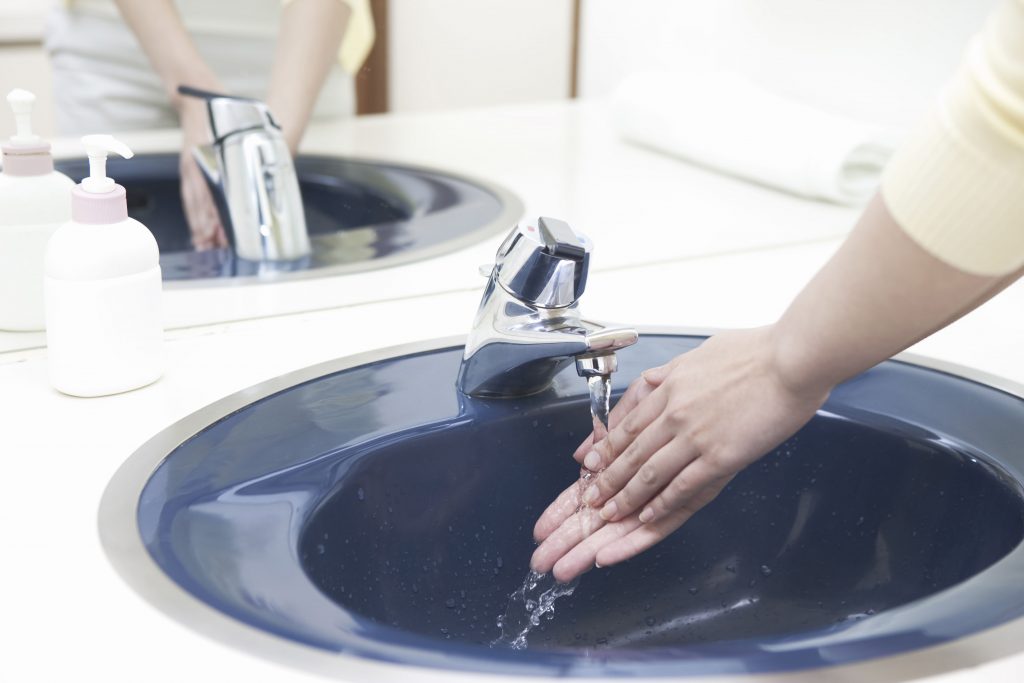Survey of handwashing behavior found in 57 Thais did not wash their hands after excretion, up to 88% of the Ministry of Public Health, indicated that they washed their hands properly for 15 seconds, helping to reduce germs by 90%.
Dr. Piyasakol Sakolsatayadorn, Minister of Public Health (Ministry of Health), said that on October 15 of each year, it was designated as World Handwashing Day. To create a culture of hygienic hand washing is the best and easiest way to prevent disease. Especially digestive and respiratory diseases Data from UNICEF found that each year, approximately 3.5 million children under 5 years of age die from diarrhea and 25% of pneumonia in Thailand. Bureau of Epidemiology reported from January 1 to September 30, 2015, there were 828,206 diarrhea cases, 7 deaths and 51,546 people with influenza, 25 deaths.
Dr. Piyasakon said that now, although the people are paying attention to prevention of many forms of disease Either use a cloth to cover your nose, put on gloves, and use products such as disinfectant soap and disinfectant sprays, but this is not enough. Hand washing is required for disease prevention to be more effective. A study in the United States found that hand washing properly for just 15 seconds can reduce germs by 90 percent, therefore, the Ministry of Public Health has a policy to encourage people to wash their hands with clean water and wash with soap. To reduce sickness from infectious diseases To adhere to the principle of washing “2 before 5 after” ie before eating. Before preparing or cooking Wash into the bathroom after handling dirt. After visiting the patient After touching a pet And after returning from outside the house The results of the survey of handwashing behavior among Thai working-age people aged 15 and over by the Department of Health Service Support in 2014 found that 88% of their hands did not wash their hands after having a bowel movement.
Survey of handwashing behavior found in 57 Thais did not wash their hands after excretion, up to 88% of the Ministry of Public Health, indicated that they washed their hands properly for 15 seconds, helping to reduce germs by 90%.
Dr. Piyasakol Sakolsatayadorn, Minister of Public Health (Ministry of Health), said that on October 15 of each year, it was designated as World Handwashing Day. To create a culture of hygienic hand washing is the best and easiest way to prevent disease. Especially digestive and respiratory diseases Data from UNICEF found that each year, approximately 3.5 million children under 5 years of age die from diarrhea and 25% of pneumonia in Thailand. Bureau of Epidemiology reported from January 1 to September 30, 2015, there were 828,206 diarrhea cases, 7 deaths and 51,546 people with influenza, 25 deaths.
Dr. Piyasakon said that now, although the people are paying attention to prevention of many forms of disease Either use a cloth to cover your nose, put on gloves, and use products such as disinfectant soap and disinfectant sprays, but this is not enough. Hand washing is required for disease prevention to be more effective. A study in the United States found that hand washing properly for just 15 seconds can reduce germs by 90 percent, therefore, the Ministry of Public Health has a policy to encourage people to wash their hands with clean water and wash with soap. To reduce sickness from infectious diseases To adhere to the principle of washing “2 before 5 after” ie before eating. Before preparing or cooking Wash into the bathroom after handling dirt. After visiting the patient After touching a pet And after returning from outside the house The results of the survey of handwashing behavior among Thai working-age people aged 15 and over by the Department of Health Service Support in 2014 found that 88% of their hands did not wash their hands after having a bowel movement.
Dr Sopon Mekthon, Permanent Secretary, Ministry of Public Health, said that this year’s World Handwashing Day, the Ministry of Public Health campaigned for all Thai people to turn their attention to washing their hands with soapy water every time. And the Department of Health encourages organizations such as hospitals, schools, temples, government agencies, shopping centers, food centers, fresh markets, etc., to arrange hand washing basins and hand soap facilities. To facilitate people to wash their hands, I am confident that if all people have a habit of washing hands until they become a habit Will make sickness from infectious diseases As well as from various toxins eventually reduced. The right way to wash your hands with soap and water, there are 7 steps, including 1. The palms rub together 2. The palms rub the back of the hand and the fingers rub between the fingers. Hand 4. After the finger rub the palm 5. Rub the thumb around the palm 6. The fingertips rub across the palm and 7. Rub around the wrist every step, repeat 5 times, alternating on both sides will make the hand clean.

